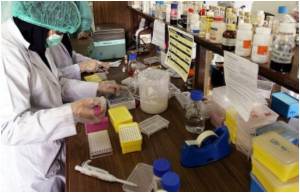Researchers have discovered a signaling molecule that essential for maintaining a balance immune response.

The results raise hopes that the MKP-1 pathway will lead to new tools for shaping the immune response, said Hongbo Chi, Ph.D., assistant member of the St. Jude Department of Immunology and the study's senior author. The co-first authors are Gonghua Huang, Ph.D., and Yanyan Wang, Ph.D., both postdoctoral fellows in Chi's laboratory.
The findings provide new details about how dendritic cells regulate the fate of naïve or undifferentiated T cells. Dendritic cells are the sentinels of the innate immune response, patrolling the body and ready to respond at the first sign of infection.
Investigators were surprised that a single molecule regulated production of three out of the four major subsets of T cells, which each play different roles. MKP-1 is a negative regulator of the enzyme p38, which is part of the MAP kinase family of enzymes that control pathways involved in cell proliferation, differentiation and death.
Chi and his colleagues demonstrated that MKP-1 works in dendritic cells by altering production of protein messengers known as cytokines. Those cytokines determine which subset of specialized T cells the undifferentiated T cells are fated to become. In this study, scientists showed that MKP1 controls production of the cytokines that yield T helper 1 (Th1), T helper 17 (Th17) and regulatory T (Treg) cells. Th1 cells combat intracellular bacterial and viral infections. Th17 cells fight extracellular bacterial infections and fungi. Treg cells help with immune suppression, protecting against autoimmune diseases.
The study showed that suppression of p38 by MKP-1 promotes production of interleukin 12 (IL-12), which leads to an increase in Th1 cells. Rising IL-12 coincides with a drop in interleukin 6 (IL-6) and a corresponding dip in production of Th17. MKP-1 also inhibited the generation of Treg cells by down-regulating production of a third cytokine, TGF-beta.
Advertisement
"MKP-1 is the first signaling molecule found in dendritic cells to program differentiation of these diverse T- cell subsets," Chi said.
Advertisement
Source-Eurekalert










